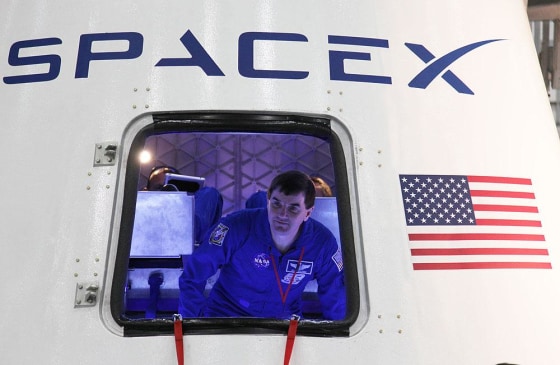In the wake of all the jabs about trade sanctions, trampoline launches and a space station pullout, America's dependence on Russian space hardware is suddenly looking like a bad idea. But Rand Simberg, a self-described recovering aerospace engineer, says policymakers should have seen it coming.
"I think the scales have been falling off people's eyes in Washington, and now they realize what a huge mistake they made 20 years ago," Simberg told NBC News.
Simberg argues that there's a connection between the current troubles with Russia and America's post-Apollo space policy. "The reason that we're dependent on the Russians," he said, "is because we're chicken...," he said. (Simberg added another word after "chicken" that may not be suitable for a family publication.)
In his book "Safe Is Not an Option," Simberg argues that America's space program has stagnated because it's become so risk-averse. The way he sees it, policymakers learned the wrong lessons from the 1986 Challenger shuttle disaster and the 2003 loss of the shuttle Columbia.
Rather than doubling down on an expensive launch system, NASA and Congress should have looked to more reliable, more commercially viable alternatives, he says. And Simberg fears that they're making the same mistake with the heavy-lift Space Launch System, which is arguably more expensive than the shuttle.
Some members of Congress argue that spaceflight has to be expensive, and has to be under the control of the government, because commercial launch providers may not measure up to their safety standards. But Simberg says the bureaucratic fixation on complete safety is wrong-headed.
"The point that I make in the book is that there is no 'safe,'" he said. "It's always a continuum. There is no 'safe' or 'unsafe' unless we quantify what's the cost of a loss of crew."
He explains that the safety of a risky endeavor should be measured against the importance of that endeavor. For example, the U.S. military's role is so important that casualties, even non-combat casualties, are a given. If space exploration and settlement is in the national interest, Simberg argues that there should be a more reasonable balance between those endeavors and their risks.
"We're behaving as though space isn't important," Simberg said. "I am not going to try to convince somebody that space is important. I'm just saying that if it is, we should be doing things differently."
This week he laid out some recommendations in an op-ed column for USA Today and a follow-up on The Corner, a blog at National Review Online. The top item: Accelerate NASA's commercial crew program, which is currently supporting the development of U.S. commercial spaceships to carry astronauts to and from the International Space Station. NASA is aiming to have those spaceships ready by 2017, but Congress has consistently pared down funding requests for the effort.
Getting U.S. space taxis flying to the station sooner rather than later is an essential step toward reducing reliance on the Russians. The approach has already worked for cargo transport: NASA now has two competing launch providers, SpaceX and Orbital Sciences Corp., that can deliver goods to the space station more cheaply than the shuttle could.
Simberg also took issue with Congress' latest NASA authorization bill, which currently states that "safety is the highest priority" for the commercial crew program. "When that stupid bill gets to the floor, let's fix it," he said. Here's his suggested alternate language:
"The exploration and development of space is a national priority. Therefore, NASA’s first priority must be mission success in the critical steps toward reaching this goal. Consistent with this priority NASA shall strive at all times to achieve a level of safety comparable to that enjoyed by other critical national programs in extreme environments, such as deep-ocean and polar activities."
Does that sound like a reasonable policy? Join Rand Simberg and yours truly at 8 p.m. ET Wednesday for a discussion of space policy and spacecraft safety on "Virtually Speaking Science," an hourlong talk show that's broadcast on BlogTalkRadio. You can also be part of the live virtual audience in the Exploratorium's Second Life auditorium. If you miss the live show, never fear: You can catch up with the archived podcast via BlogTalkRadio or iTunes.
Listen for the secret word on "Virtually Speaking Science" and enter it as a comment on this Facebook item from NBC News Science. The first commenter to do so will be eligible to receive a free copy of "Safe Is Not an Option."
Our previous "VSS" guest was physicist Michio Kaku, talking about the future of the mind. And on June 4, stay tuned for a "VSS" session with Alan Stern, principal investigator for NASA's New Horizons mission to Pluto.
